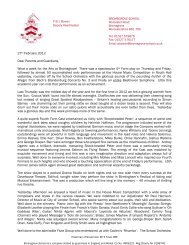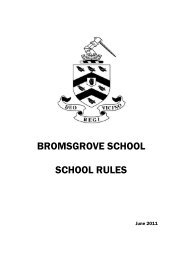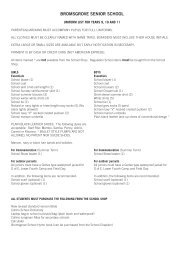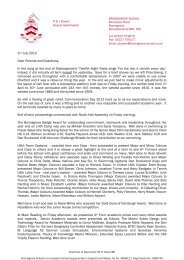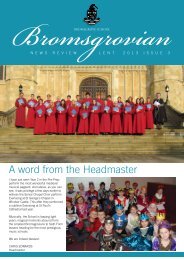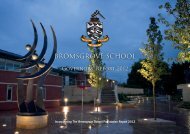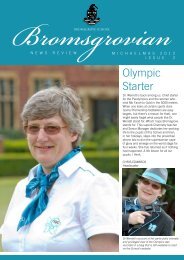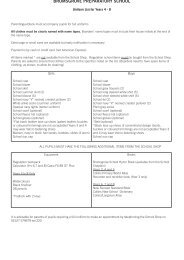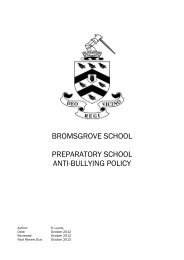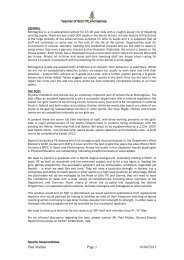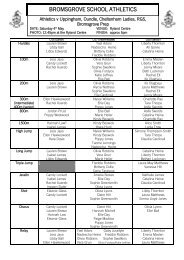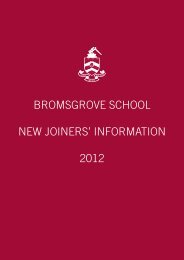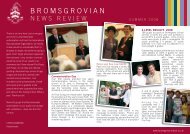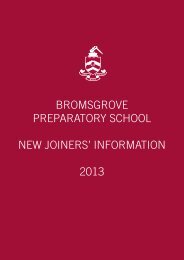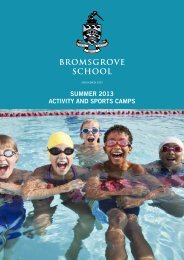Sixth Form Course Booklet 2013 - Bromsgrove School
Sixth Form Course Booklet 2013 - Bromsgrove School
Sixth Form Course Booklet 2013 - Bromsgrove School
Create successful ePaper yourself
Turn your PDF publications into a flip-book with our unique Google optimized e-Paper software.
MUSIC<br />
WHY STUDY MUSIC?<br />
We all use music. The study of what it is, how it works and how to create it opens our minds to one of the richest of all<br />
artistic mediums. Music is made from exquisitely fashioned patterns, and through understanding and control of these<br />
you can express who you are, what concerns you, and what you aspire to be. Music is, potentially, a life-long study;<br />
through deepening your understanding of it, you learn to respond to other people’s music, as well as your own, with<br />
increased perception and enthusiasm. The diversity of the subject means that music also has profound benefits for the<br />
general development of intellectual flair and self-confidence.<br />
AIMS OF THE COURSE<br />
The AS/A2 specification seeks to build on GCSE by improving creative and performing work through a much more<br />
advanced understanding of the techniques used in composing music. Analysis of music is therefore a key component.<br />
Focus is directed towards how the key ingredients of music – melody, harmony, rhythm, texture, timbre and form –<br />
have been utilised in creating different styles over time. The revised specification (new from September 2008) includes<br />
some compulsory classical set works, but allows for an exciting breadth of study and for those with an interest in music<br />
technology to develop their skills.<br />
SKILLS NEEDED FOR AND DEVELOPED IN THE COURSE<br />
Pupils need to be intrigued as to how music of contrasting styles works. An almost mathematical ability to see pattern<br />
in music is a big advantage, as is an interest in the resulting aesthetic quality of music. Notation plays a key part, and<br />
(at the very least) a willingness to master the reading of musical notation is essential.<br />
REQUIREMENTS FOR STARTING THE COURSE<br />
A minimum of a grade B in GCSE Music is normally required, but pupils who have not taken Music at GCSE are<br />
welcome on the course if they have sufficient grounding in practical music. Since performing is involved in the<br />
assessment at both AS and A2, candidates need some proficiency on an instrument (or voice) – ideally of grade V<br />
(ABRSM) standard or above – or, alternatively, an advanced skill in using sequencing and recording technology.<br />
Keyboard skills are an advantage too. We would expect pupils on the course to be active in extra-curricular musicmaking<br />
as an important ‘hands-on’ experience that can inform the learning process in the classroom.<br />
<strong>Course</strong> followed: Music<br />
Examination Board: AQA<br />
CONTENT OF THE COURSE UNITS<br />
Unit 1:<br />
Unit 2:<br />
Influences on Music<br />
Based on two Areas of Study:<br />
Western Classical tradition (compulsory)<br />
(set work: Beethoven Symphony no. 1, Movements 1 & 2)<br />
and one of…<br />
Choral Music in the Baroque<br />
Music Theatre 1940-80<br />
British Popular Music from 1960<br />
Composing: Creating musical ideas<br />
one of:<br />
Compositional techniques (i.e. harmony and counterpoint)<br />
Free composition to a given brief<br />
Arranging of a set melody<br />
78



